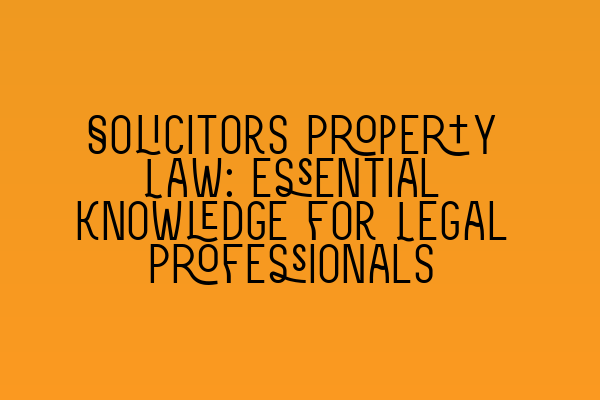Welcome to SQE Property Law & Land Law, where we provide comprehensive legal services for all property-related matters. As experienced solicitors, we understand the complexities of property law and the importance of having the necessary knowledge to navigate these intricacies successfully. In this blog post, we will discuss the essential knowledge that legal professionals must possess in the field of property law. Whether you are a solicitor, aspiring solicitor, or simply interested in expanding your understanding of property law, this article is for you.
1. Understanding Property Law Basics
To effectively practice property law, it is crucial to have a strong foundation in the basics. Property law governs the rights and responsibilities associated with land and buildings, including ownership, use, and transfer. Familiarizing yourself with key concepts such as freehold, leasehold, easements, and covenants is essential. Additionally, understanding the various types of ownership, such as joint tenancy and tenancy in common, will enable you to provide accurate advice to clients.
For a more in-depth understanding of property law basics, you can check out our SQE 1 Practice Exam Questions and SQE 1 Practice Mocks FLK1 FLK2.
2. Conveyancing Process
Conveyancing is a fundamental part of property law, involving the transfer of legal ownership from one party to another. As a solicitor, you must have a thorough understanding of the conveyancing process and the legal requirements involved. This includes conducting searches, drafting contracts, and ensuring compliance with relevant regulations. A comprehensive knowledge of land registration is also crucial to guarantee a smooth transfer of ownership.
For those seeking to deepen their understanding of the conveyancing process, we offer specialized courses in SQE 2 Preparation and SQE 1 Preparation.
3. Leasehold and Tenancy Matters
Leasehold and tenancy matters form a vital aspect of property law, particularly regarding residential and commercial properties. Being well-versed in the rights and obligations of both landlords and tenants is essential to guide clients through lease negotiations, renewals, and disputes. Understanding the intricacies of leasehold enfranchisement, service charges, and breach of lease terms will enable you to protect your clients’ interests effectively.
4. Landlord and Tenant Law
As a solicitor specializing in property law, it is crucial to be familiar with landlord and tenant law. This includes knowledge of the rights and responsibilities of both parties, as well as the procedures for eviction and rent recovery. Understanding different types of tenancies, assurance of tenancy, and the implications of the Housing Act 1988 is crucial to provide accurate advice and guidance to clients in this area.
5. Real Estate Development and Planning
Another crucial aspect of property law is real estate development and planning. This field encompasses complex regulations regarding land use, zoning, and obtaining planning permissions. Having a strong knowledge of the planning process, environmental impact assessments, and development agreements is essential when advising clients on property development projects. Additionally, being familiar with local regulations and government policies will ensure compliance throughout the development process.
If you are interested in the latest SRA SQE exam dates, we provide up-to-date information on our website: SRA SQE Exam Dates.
Conclusion
In summary, possessing essential knowledge in property law is integral to providing effective legal services in the field. Understanding property law basics, conveyancing processes, leasehold and tenancy matters, landlord and tenant law, and real estate development and planning will equip you with the expertise needed to navigate the complexities of property-related cases. Continuously staying updated with the latest developments in property law will further enhance your professional capabilities and ensure your clients receive the highest quality representation.
